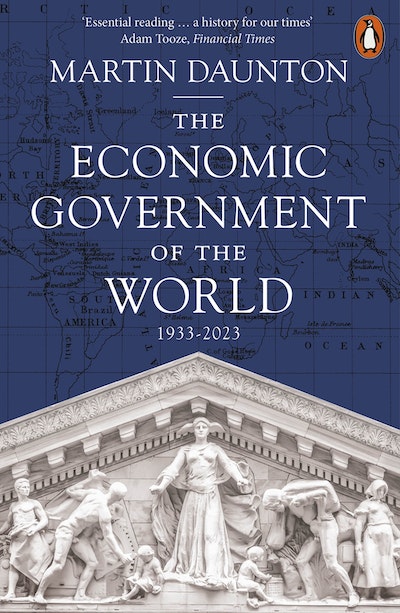- Published: 20 January 2026
- ISBN: 9780141038674
- Imprint: Penguin Press
- Format: Paperback
- Pages: 1024
- RRP: $45.00
The Economic Government of the World
1933-2023
- Published: 20 January 2026
- ISBN: 9780141038674
- Imprint: Penguin Press
- Format: Paperback
- Pages: 1024
- RRP: $45.00
The Economic Government of the World is a tour de force. It lets us see the evolving architecture of global economic governance over the last hundred years - the various architects and the designs they favoured, the scaffolding going up (and down), the technicians responsible for fitting out the floors, and the cracks emerging in the walls and foundations. Both in terms of chronological scope and thematic range, I know of no book like it. It is a hugely ambitious and timely work.
Frank Trentmann, author of EMPIRE OF THINGS
Martin Daunton's history of global economic government is rigorous, engaging and astonishing in its range. It shows why any arrangement of the international economic system unavoidably involves political compromise - and concludes with a wise vision of "messy multilateralism" as a path out of our current crisis. A brilliant and important book.
Sunil Amrith, author of UNRULY WATERS
Daunton's magisterial history is an urgent reminder of the sources and dangers of economic and financial disorder, revealing the interconnections between trade, money, population and development and the hard-fought struggles of leading capitalist democracies to embed the lessons of the past in international institutions. With our world at a critical juncture, the book is a chilling reminder of the risks we face, while offering a positive vision of the way forward.
Patricia Clavin, author of SECURING THE WORLD ECONOMY
[A] capacious and timely history... Offering us a realistic assessment of what American-led governance of the world economy actually entails, Daunton's account is essential reading. Postheroic and disillusioned, this is a history for our times.
Adam Tooze, Financial Times
This new book is a history of the institutions and individuals who sought to manage the global economy over the last century. It is a huge topic, and a big book – but readers need not be discouraged as Daunton makes the story accessible and absorbing, explaining how successive orders begin to fail, break down (often painfully) and then are hesitantly replaced, with the succeeding order modified and adapted to changing circumstances until it, too, begins to weaken.
Jane Humphries, BBC History Magazine


